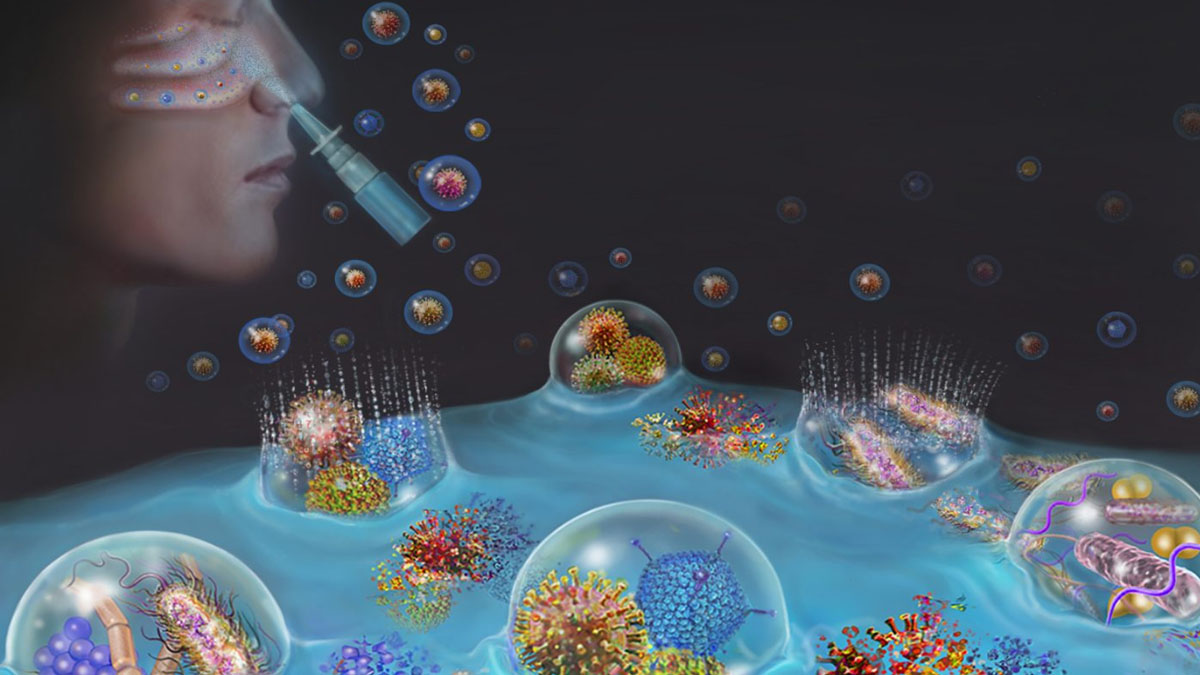
Respiratory infections like COVID-19, influenza, and the common cold are primarily spread through airborne respiratory droplets. These droplets enter our bodies through the nasal passages, where pathogens can begin to take hold. However, recent scientific advancements are showing promise in stopping these infections before they even start. A team of researchers from Brigham and Women’s Hospital, affiliated with Harvard Medical School, has developed a nasal spray that can serve as a powerful defense against respiratory pathogens.
This innovative nasal spray, known as the Pathogen Capture and Neutralizing Spray (PCANS), is designed to form a protective barrier inside the nose, trapping and neutralizing harmful viruses and bacteria before they can infect the body. This new development could be a game-changer in the fight against respiratory illnesses.
How Does the Nasal Spray Work?
The nasal spray works by creating a gel-like protective layer in the nasal cavity. This layer captures large respiratory droplets, acting as both a physical barrier and a neutralizer of the pathogens carried in these droplets.
Key Features of PCANS:
- Protective Gel Barrier: The spray forms a gel that adheres to the nasal lining, trapping respiratory droplets that carry pathogens.
- Neutralization of Pathogens: Not only does it block the pathogens, but it also neutralizes them, reducing their ability to cause infection.
- Long-lasting Protection: In animal studies, the spray was shown to provide protection for up to 8 hours after application.
Potential to Block Multiple Viruses
One of the most exciting aspects of PCANS is its broad-spectrum effectiveness. The spray has shown potential to block not just COVID-19 but also other respiratory pathogens like influenza and bacteria that cause pneumonia. This makes it a valuable tool in protecting against various illnesses that spread through the air, including the common cold.
Viruses and Bacteria the Spray Can Protect Against:
- COVID-19: The nasal spray could block SARS-CoV-2, the virus responsible for COVID-19.
- Influenza (Flu): It has been tested in models of severe Influenza A, showing promising results in reducing the viral load.
- RSV (Respiratory Syncytial Virus): The spray could offer protection against this virus, which primarily affects young children and the elderly.
- Pneumonia-Causing Bacteria: PCANS may also neutralize bacteria responsible for severe respiratory infections, such as pneumonia.
Study Results: Promising Findings in Animal Models
In a study published in Advanced Materials, researchers tested PCANS on mice. The results were remarkable, with treated mice showing almost complete protection against respiratory infections compared to those that did not receive the treatment. Specifically, when tested in a severe Influenza A model, a single dose of the nasal spray led to a 99.99% reduction in viral load in the lungs of the treated mice. This demonstrates the spray’s effectiveness in both blocking and neutralizing viruses.
Key Study Findings:
- The nasal spray stayed in the nasal passages for up to 8 hours.
- Treated mice were fully protected from the virus, while untreated mice showed no protection.
- The spray was effective against multiple respiratory pathogens.
A Potential Solution for Gaps in Current Defenses
Traditional measures to prevent respiratory infections, such as vaccines, masks, and physical distancing, have been effective but have limitations. Vaccines may not offer complete protection against emerging variants, and masks are only effective when worn properly. PCANS could serve as an additional layer of protection, especially in situations where other preventive measures fall short.
Dr. Nitin Joshi, the lead researcher behind this study, explained that PCANS could offer broad protection against not only the current strains of viruses but also emerging variants. “With its broad-spectrum activity, it could offer defense against emerging variants of the flu, RSV, COVID-19, and beyond,” said Dr. Joshi.
Next Steps for PCANS
Although the nasal spray is still in the preclinical stage, the results so far are promising. Researchers are optimistic that PCANS could soon move to clinical trials, where its effectiveness in humans will be tested. If successful, the spray could become a widely available tool to protect against a variety of respiratory pathogens.
The spray’s simplicity and ease of use make it a practical solution for everyday protection, potentially reducing the spread of viruses in high-risk environments like hospitals, schools, and public transportation.
Conclusion: A New Frontier in Respiratory Protection
The development of the Pathogen Capture and Neutralizing Spray marks a significant step forward in the fight against respiratory infections. By creating a gel barrier in the nose that traps and neutralizes pathogens, PCANS could offer an effective and convenient way to protect against viruses like COVID-19, the flu, and the common cold. As the world continues to search for new ways to combat these illnesses, this nasal spray shows incredible promise as an additional layer of defense.
References:
- Joshi, N., et al. “Toward a Radically Simple Multi-Modal Nasal Spray for Preventing Respiratory Infections.” Advanced Materials, 24 September 2024.
- Brigham and Women’s Hospital: Development of PCANS for respiratory pathogen prevention.
Editor’s Note: This article is a reprint. It was originally published here: Health News
